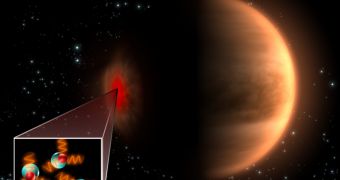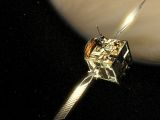This is the first time when hydroxyl molecules are detected outside Earth and the finding could unravel some of the secrets to how Venus' dense atmosphere works. Hydroxyl, if you still remember a little bit of chemistry from school, is a compound consisting of one atom of hydrogen and one of oxygen. This substance is extremely hard to detect, especially from orbit. Nonetheless, the Venus Express Visible and Infrared Thermal Imaging Spectrometer has been able to detect it 100 kilometers above the Venusian surface.
In order to do that the signal strength needed to be boosted first. This was done by positioning the spacecraft in such a way that it could peer through the atmosphere in a direction parallel to the surface of the planet. With the signal strength increased by 50, the VITIS on board ESA's Venus Express detected the infrared signature of hydroxyl molecules in an area of the atmosphere measuring only 10 kilometers across.
Hydroxyl is thought to be a key compound in the evolution of the atmosphere of a planet. Back on Earth for example, it purges pollutants out of the atmosphere, while on Mars it has the role of sterilizing the top layers of the crust and stabilizing the carbon dioxide in the atmosphere by preventing it from turning into carbon monoxide.
"Because the Venusian atmosphere had not been studied extensively before Venus Express arrived on the scene, we have not been able to confirm much of what our models tell us by observing what is actually happening. This detection will help us refine our models and learn much more", says Giuseppe Piccioni, from the Istituto di Astrofisica Spaziale e Fisica Cosmica, Principal Investigator of the VIRTIS experiment.
Hydroxyl is also associated to ozone abundance, but the amounts of ozone present in Venus' atmosphere haven't been estimated yet. Also, measurements show that hydroxyl concentrations are extremely changeable on Venus, varying with as much as 50 percent from one orbit to the next, probably due to ozone concentration variations inside the atmosphere.
"Ozone is an important molecule for any atmosphere, because it is a strong absorber of ultraviolet radiation from the Sun", says Piccioni. And radiation is also one of the most influential factors in the heating of a planet. Our own atmosphere heats itself by absorbing radiation in the stratosphere, which also protects the biosphere from ultraviolet light.
"Venus Express has already shown us that Venus is much more Earth-like than once thought. The detection of hydroxyl brings it a step closer", says Piccioni. A more detailed study of the influence of hydroxyl on Venus' atmosphere will be published based on measurements taken from 50 orbits.

 14 DAY TRIAL //
14 DAY TRIAL // 
